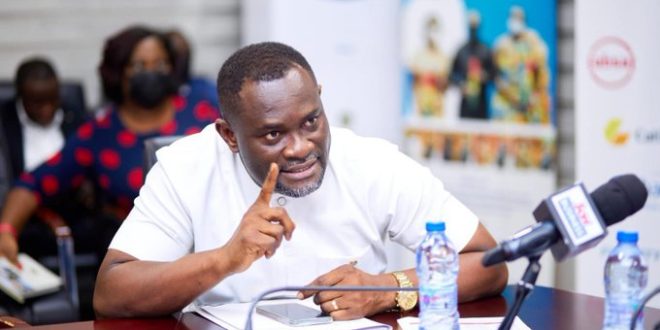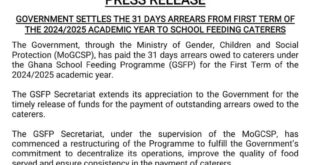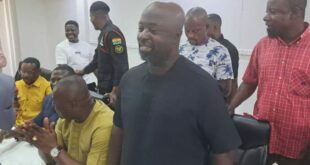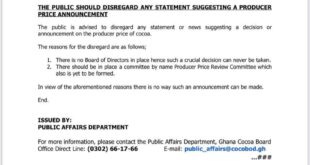The Deputy Finance Minister and the current Member of Parliament for Ejisu, Dr. John Ampontuah Kumah says Ghana’s economy has successfully overcome recent challenges, positioning itself for sustainable growth to benefit Ghanaians.
In a Facebook post dated January 19, he highlighted the unanimous approval of Ghana’s request for debt treatment under the G-20 Common Framework.
This, he believes, forms the foundation for his positive outlook on the nation’s economic trajectory.
Expressing gratitude, Dr. Kumah commended the people of Ghana for their unwavering support of the government’s measures and policies.
He specifically acknowledged their role in mitigating the adverse impacts brought about by the COVID-19 outbreak and the Russia-Ukraine war.
With optimism, the Ejisu Member of Parliament anticipates a brighter future for the country.
He emphasised that the approved debt treatment sets the stage for sustained economic progress and ultimately benefits the citizens of Ghana.
“An essential prerequisite for the IMF Programme was a confirmation that Ghana’s public debt was on a sustainable trajectory.”
“Subsequently, Ghana embarked on the restructuring of both domestic and external debt. The Domestic Debt Exchange Programme (DDEP) launched on 5th December 2022 has successfully been completed with over 90 per cent participation.
“The OCC’s approval of bilateral debt treatment is expected to provide the impetus for the ongoing commercial debt (Eurobonds) negotiations,” a portion of his Facebook post said.
Dr Kumah added that “the past week was marked by a significant development in the public debt trajectory following the unanimous approval of Ghana’s request for debt treatment under the G-20 Common Framework for Debt Treatment Beyond the Debt Service Suspension Initiative (CF-DSSI).”
“The government has been combining both fiscal prudence and debt restructuring measures to contain growth in public debt with the view of bringing the debt levels to moderate debt level from high risk of debt distress.
“The Official Creditor Committee’s (OCC) decision to support the grand efforts of government is commendable, refreshing and worth celebrating. We, however, do so with caution given that more work needs to be done going forward.”
The Managing Director of the International Monetary Fund (IMF), Kristalina Georgieva, has stated that Ghana’s economic policies under its programme are beginning to yield the desired outcomes.
She emphasised that the policy and reform commitments outlined in Ghana’s deal with the Bretton Woods Institution are in the best interest of the Ghanaian people.
In a post on X (formerly Twitter) on Tuesday, January 16, she expressed the satisfaction of the IMF board with the assurances received from Ghana’s external creditors.
“Wonderful to see President Nana Addo Dankwa Akufo-Addo and Ghana’s Finance Minister, Ken Ofori-Atta at #WEF24. The policy and reform commitments under Ghana’s economic program are starting to bear fruit,” she posted.
Read Mr. Kumah’s post below.
We turned the corner: Ghana’s Economy Positioned for Sustainable Growth
The past week was marked by a significant development in the public debt trajectory following the unanimous approval of Ghana’s request for debt treatment under the G-20 Common Framework for Debt Treatment Beyond the Debt Service Suspension Initiative (CF-DSSI). The government has been combining both fiscal prudence and debt restructuring measures to contain growth in public debt with the view of bringing the debt levels to moderate debt level from high risk of debt distress. The Official Creditor Committee’s (OCC) decision to support the grand efforts of government is commendable, refreshing and worth celebrating. We, however, do so with caution given that more work needs to be done going forward.
The OCC is made up of Ghana’s bilateral creditors and was constituted on 12th May 2023 under the auspices of the Paris Club. France and China co-chair the Committee. The unanimous approval paves the way for the International Monetary Fund (IMF) to hold an Executive Board meeting to consider the Staff Level Agreement (SLA) reached between Government and the IMF Mission during their first review mission of the Extended Credit Facility (ECF) Programme. A successful IMF Executive Board meeting will subsequently lead to the disbursement of the second tranche of US$600.0 million in line with the disbursement arrangement of the ECF.
The OCC’s magnanimity also paves the way for the finalization of the Memorandum of Understanding (MoU) to be signed between the Government of Ghana (GoG) and the OCC and the potential re-start of the implementation of selected list of foreign-financed projects/programme, which currently are delayed and are at various stages.
As may be recalled, the President of the Republic of Ghana, His Excellency Nana Addo Dankwa Akufo-Addo, on 1st July 2022, directed the Finance Minister to request an IMF programme under the ECF to deal with challenges that had bedeviled the economy emanating primarily from the impact of COVID-19 Pandemic and domestic vulnerabilities. Subsequently, on May 17th, 2023, the ECF program was approved to support Ghana’s economic recovery efforts dubbed Post COVID-19 Programme for Economic Growth (PC-PEG). The broad contour of the programme aims to restore macroeconomic stability and debt sustainability on the back of wide-ranging reforms to build resilience and lay the foundation for more robust and inclusive growth.
An essential prerequisite for the IMF Programme was a confirmation that Ghana’s public debt was on a sustainable trajectory.
Subsequently, Ghana embarked on the restructuring of both domestic and external debt. The Domestic Debt Exchange Programme (DDEP) launched on 5th December 2022 has successfully been completed with over 90 percent participation. The OCC’s approval of bilateral debt treatment is expected to provide the impetus for the ongoing commercial debt (Eurobonds) negotiations.
Having a hold on Ghana’s debt trajectory in 2024 is particularly important for two reasons. Firstly, the global economy is projected to experience sluggish growth, with a forecasted rate of only 2.4 percent. This would be the weakest growth rate since the beginning of the Covid-19 pandemic and the slowest in the past three decades. On the back of this sorry record, borrowing cost of most developing economies especially those with weak sovereign credit ratings are expected to witness an uptake as the global interest rate regime remains high. The disturbing signal from this is the fact that by the end of 2024, approximately one out of every four developing countries and around 40% of low-income countries will still be economically poorer than they were on the eve of the COVID pandemic in 2019, as reported by the World Bank. The concomitant effects of this forecast plummet in global growth could undermine the steady progress we have made unless the underlying issue of debt unsustainability is fully and comprehensively addressed.
The second important factor to consider is that in 2024, over 70 countries, with a combined population of approximately 4.5 billion people, are scheduled to hold elections. The outcomes of these elections, especially those in America, Mexico, India and Russia will have a significant implications for the future of democracy and multilateralism . The outcomes of these elections have the potential to bring about substantial changes that could disrupt the global economic architecture. This, in turn, would have a ripple effect that would be felt predominantly in developing and low-income countries, especially those with diversified and integrated economies. It is crucial not to underestimate the potential challenges and headwinds that Ghana’s economy may face as a result of these imminent issues.
Despite the potential global challenges mentioned earlier, government remains optimistic and determined to build upon the achievements made under the IMF Programme in order to further improve the welfare of Ghanaians. Job creation, youth development, and empowerment initiatives will continue to receive unwavering support from the government. Ghana’s dynamic and diverse population will remain the nation’s most valuable asset and government will strive to optimize the potential benefits from this valuable resource. I urge all Ghanaians to continue to support government as we chart a new path in our public administration and management, with a strong focus on sustainability.
THANK YOU for constantly reading stories on MyGhanaMedia.com, a news publishing website from Ghana. Kindly like, follow, comment, and SHARE stories on all social media platforms for more entertaining updates!
Source: MyGhanaMedia.com
There are four types of content published on MyGhanaMedia.com daily: curated content; syndicated content; user-generated content; and original content.
 MYGHANAMEDIA.COM Best Source Of Latest News
MYGHANAMEDIA.COM Best Source Of Latest News





